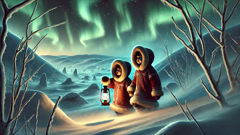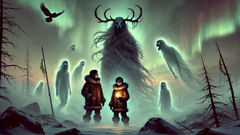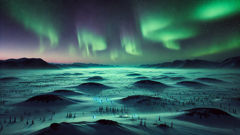Introduction
In the far reaches of Nunavut, where the land is sculpted by wind and ice, and the sun can linger for weeks without setting or vanish for just as long, stories have always drifted like snow across the tundra. Here, every shape on the horizon could be something else—an iceberg, a caribou, or perhaps something much older, born from the same darkness that once ruled the long Arctic nights. Among the Inuit, tales of the Ijiraq are whispered on the breath of winter: shape-shifters that wear the faces of caribou or ravens or even people, luring children away from the safety of the iglu, the village, or the circle of their family. But these are not stories for the faint-hearted. The Ijiraq are said to be neither evil nor kind, only wild and lost—creatures that slipped between worlds and now walk the land unseen. To see one is to risk forgetting who you are, or worse, to be taken and hidden away between worlds, unable to find your way home. In a small modern hamlet nestled beside a frozen bay, where snowmobiles are parked alongside sleds and the aurora dances overhead, a family’s courage will be tested by these legends. On the edge of a never-ending twilight, siblings Siku and Pipaluk will face a journey that blurs the line between myth and reality, after their little brother vanishes into the land of shifting shadows. This is a story of fear and hope, of old spirits and the power of memory, spun from the fabric of the North itself.
Chapter One: The Vanishing
It began on a night that didn’t quite become night—one of those endless Arctic dusks when the sun rolls just above the edge of the world, painting the sky in bruised violets and fading gold. In the hamlet of Qiniq, the air tasted of ice and wood smoke. The community had gathered for an evening of stories and bannock, children tumbling over each other, parents swapping tales older than memory itself. Siku, at sixteen, had grown tall and lean, his face sharp as a ptarmigan’s beak, eyes tuned to every change in the wind. His little brother, Nanuq, was only seven, restless as a snowflake. Their sister, Pipaluk, twelve and fierce, moved between the two like a seal in open water—steady, quick, impossible to shake.

That evening, as Siku helped haul in driftwood and Pipaluk chased Nanuq around the old icehouse, a sudden stillness fell. Dogs raised their heads. The elders’ voices slowed. A shadow slipped past the houses, not quite person, not quite animal—gone before anyone could turn. Siku felt it deep in his bones: a wrongness, ancient and cold. He glanced at Pipaluk, who frowned, nose wrinkling against the wind. “Stay close,” he murmured, but Nanuq was already gone, darting after a shape that seemed to flicker just beyond the next snowdrift.
The world shifted. Siku sprinted after his brother, Pipaluk a heartbeat behind. The cold bit harder, and the colors of twilight thickened, swirling with the green and purple ribbons of the aurora. Nanuq’s laughter echoed strangely—near, then far, then nowhere at all. The snow grew deep, swallowing footprints as quickly as they formed. “Nanuq!” Pipaluk shouted, her voice cracking the frozen air. Silence answered.
They searched until the sky blazed with stars. Their village joined in, lanterns bobbing through the willows and drifts, voices calling into emptiness. Siku’s mother wept quietly by the stove, her hands tracing protective patterns on her coat. “The Ijiraq,” whispered an elder, her words falling like frost. “They take those who forget themselves. Children who stray too far.” That night, as the wind howled around their home, Siku lay awake, haunted by the shadow that had passed and by the memory of Nanuq’s small hand slipping from his grasp.
The next morning, the world felt thinner—every sound sharper, every face drawn. Siku and Pipaluk gathered supplies: mukluks, dried seal meat, a battered compass, a carved amulet their grandfather had left them. They would not wait for another search party. They would find Nanuq themselves. Their mother kissed them fiercely at the threshold, pressing a piece of caribou sinew into Siku’s palm. “Remember who you are,” she told them both, her voice fierce as the north wind. “And don’t look too long at things that shift.”
They set out under a sky ablaze with morning light. The land was endless—hills and frozen lakes, wind-bent trees, hollows where stories lay buried beneath snow. Pipaluk led at first, reading old tracks, every nerve thrumming with hope and fear. They called for Nanuq again and again, but only the ravens answered, black wings flashing against the pale sky. By midday, strange shapes began to appear—a fox, then a caribou standing too still, too watchful. Once, Siku thought he saw a child darting behind a rock, but when he reached it, only shadows remained. Pipaluk gripped his hand tightly. “The Ijiraq are close,” she whispered. “We mustn’t forget the way home.”
They pressed on, driven by love and stubbornness, hearts pounding in time with the crunch of their boots. As night crept in—though the sky never fully darkened—the world changed again. Sounds warped. The air shimmered. They found themselves walking in circles, passing the same twisted willow again and again. “They’re hiding him,” Siku said softly, voice rough with fear. “And they’re hiding us from ourselves.” Pipaluk took out the amulet and held it high, chanting the old words their grandfather had taught them. For a moment, the world steadied. Siku remembered the smell of home, the warmth of his mother’s arms. He squeezed Pipaluk’s hand, and together, they stepped deeper into the shifting heart of the tundra.
Chapter Two: Shadows Between Worlds
The deeper they ventured, the stranger the land became. The tundra’s familiar hush was broken by echoes that didn’t belong—childish laughter woven with guttural whispers, the flap of wings that left no mark in the snow. The sun hovered low and restless, never fully setting nor rising, caught in a perpetual twilight that played tricks on memory. Siku tried to focus on the feel of the amulet around his neck and the steady warmth of Pipaluk’s presence beside him. But with each step, doubt pressed harder. Was that rock ahead always there? Did those willows lean in so closely before?

They stopped to rest beneath a low hill dotted with ancient stone markers. Pipaluk set out dried seal meat, her hands trembling despite her brave face. “Grandfather said Ijiraq can look like anyone,” she murmured. “They wear the faces of animals, sometimes even people we love.” Siku nodded. He remembered stories of children lured by voices that sounded like family, only to vanish between the worlds. “We have to trust each other,” he said. “If you see me change, call my name.”
Night deepened around them, stars burning with strange intensity. The aurora flickered in and out, painting wild colors over the snow. Suddenly, a shape darted behind a drift—a child’s silhouette, small and quick. “Nanuq!” Pipaluk cried, springing up. Siku grabbed her arm. “Wait!” But it was too late—she was already running toward the figure, which stopped at the edge of a frozen pond, beckoning with a crooked hand. Siku followed, heart pounding, clutching his amulet.
The air at the pond’s edge shimmered with cold. The figure turned—a boy’s face, but wrong somehow, eyes too dark and too deep, smile stretched wide. “Come play,” it whispered in Nanuq’s voice. Pipaluk froze. Siku stepped forward, his voice steady but soft. “You’re not our brother.” The thing hissed, form shifting—becoming taller, then sprouting antlers, then dissolving into mist. The world warped, and for a heartbeat, Siku thought he saw dozens of shapes flickering through the trees: ravens, foxes, lost children, all changing from one form to another.
They stumbled back from the pond, breath ragged. “We have to find the place between,” Pipaluk gasped. “The space where the Ijiraq hide.” Siku nodded, remembering another piece of grandfather’s stories: “The Ijiraq live in the places that aren’t quite here or there. We must look for what doesn’t belong.” They searched for hours, watching for patterns that broke—rocks that cast no shadow, trees bent against the wind instead of with it. At last, they found a hollow ringed by stones that seemed to hum with old magic.
Crossing its threshold was like stepping through a curtain of cold water. The world inside was warped—a landscape of endless dusk and impossible echoes. Shadows drifted like smoke, and the air was filled with a thick, sweet scent. Here, Siku and Pipaluk clung to each other, repeating their names, their village, the sound of their mother’s lullaby. “Remember yourself,” Pipaluk whispered again and again.
Shapes loomed out of the fog—children lost long ago, faces half-remembered, all calling in voices that tugged at the edges of memory. One reached for Siku, its hand icy and familiar. He recoiled, clutching his amulet. Pipaluk sang the old song, voice trembling but clear. The shadows recoiled. A great figure rose up then—a being both man and animal, eyes shifting from amber to black, its form never quite settling. It was the Ijiraq itself, ancient and restless, longing and wild. “Why do you come?” it asked in a thousand voices. Siku stepped forward, voice strong. “We’ve come for our brother. He belongs with us.”
The Ijiraq regarded them with sorrow and hunger. “So many are lost,” it said. “Some forget. Some choose to stay.” Siku looked around at the shadows swirling near its feet, saw flickers of recognition—faces that almost smiled. “We won’t forget,” he promised. “We remember our names. We remember home.” Pipaluk added her own words: “Let us go back, all of us who want to remember.”
For a long moment, nothing happened. Then, the Ijiraq sighed—a sound like wind over ice—and stepped aside. Nanuq appeared at its feet, dazed and blinking. Siku ran to him, pulling him close. “You found me,” Nanuq whispered. “I heard you calling.” The shadows faded; the world shuddered and realigned.
They stumbled out of the hollow as dawn finally broke, golden light flooding the tundra. The path home was clear at last—footprints leading straight back to Qiniq, where their mother waited with arms wide open. The Ijiraq watched from the edge of the world, forever shifting, forever searching for those who forget—but this time, it let the children go.
Conclusion
Back in their village, with Nanuq safe and the sun shining clear for the first time in days, Siku and Pipaluk understood just how thin the boundary between worlds could be. The Ijiraq were not simply monsters from old tales—they were reminders of all that is wild and unknowable in the land, of the importance of remembering who you are and where you come from. News of their journey spread quickly, retold around kitchen tables and over radios crackling with static. Elders nodded gravely, some weeping with relief, others cautioning that not every child found by the Ijiraq was so lucky. Yet hope grew in Qiniq: perhaps old stories could teach new strength; perhaps courage and memory could guide you home from even the darkest places. That night, as the aurora danced once more, Siku sat with Nanuq and Pipaluk beneath the open sky. The world seemed vaster than before—more mysterious, but also brighter. In their hearts, they carried the lesson of the Ijiraq: never let go of your name, your family, or the path that leads you home.













